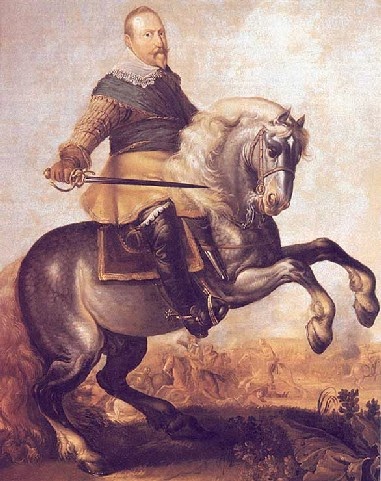Thursday, February 13, 2014
Great Captains - Gustavus Adolphus
Gustaf Adolf II was King of Sweden from 1594-1632 and he was naturally a major player in the Thirty Years War of that time period. His reign is seen as a sterling example of how to "modernize" and greatly improve the efficiency of one's military in a short time period. In terms of training and strategic competence he is one of the foremost military leaders in history. Training is a very difficult thing to grasp, whether strict methodology and rigorous drills are the best method or more flexible procedures. The Non-Orthodox (loosely translated as "Guerilla," though any non traditional troop falls into this category) vs. Orthodox paradigm essentially; an ideal military utilizes both types of troops to their advantage. Hannibal is perhaps the foremost at integrating vastly different troop types into a seamless whole; but Gustavus may have been the best at simply training exceptional Orthodox troops (which dominated much of Europe for the next two centuries).
Gustavus is recognized by the vast majority of military historians as a commander on par with Napoleon (who also recognized him as such) or Frederick the Great; but his campaigns show no great tactical competence, though he definitely demonstrates the other elements of being a "Great Captain." The general consensus is that he died too young (in battle, at Breitenfeld) and in the midst of his zenith campaign. Sweden was certainly the most prosperous during his rule and retained much of its power for several generations thereafter; so his capabilities as a ruler are unquestioned. But typically you'd want someone who had demonstrated tactical acuity in addition to strategic and marshaling competence; ultimately it is not for me to say as he did die young.
So, what things can be learned from Gustavus? The most important thing is that what you start out with does not matter, you can have a mediocre military framework or even a particularly bad one and can still innovate and improve upon both your internal military strength and your external military reputation worldwide. Once power over the military is attained a truly competent leader can reform and refit his men into the finest fighting force in the entire world. His system was largely merit based, one's family did not play a role in his ability to be promoted and thus the military blossomed as they were aptly rewarded for competence. This is a fairly early example of such a process; and even most of today's militaries don't follow this procedure; nepotism is perhaps the first sign of decay in any organization and having a truly merit based system is the antithesis of that.
Still, Gustavus' lack of any exceptional battle to look back upon is worrisome and it is difficult to teach precisely what lessons you could learn from his administration. To be sure he had fairly competent leaders against him in both Tilly and Wallenstein, but neither had the sheer initiative that Gustavus had and I feel in time he could have summarily dismantled parts of the Holy Roman Empire. The Protestant faith itself would not be what it is today without Gustavus Adolphus protecting it, and this is perhaps why Dodge specifically recognized him. His pre-eminence was also the consensus of the thought period and may even be in the historical consciousness today (though said consciousness is quite static and in need of reform).
Subscribe to:
Post Comments (Atom)

No comments:
Post a Comment